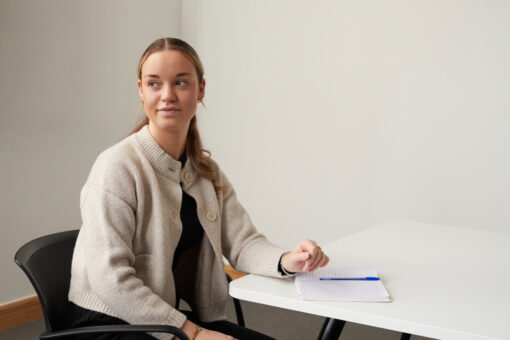Applications are now open to join the programme in summer 2025.
Changing narratives: Being challenged and learning to challenge

Sophie was part of the third cohort of Approach Social Work, formerly known as the Frontline programme, in 2016 and now works as a team manager in the safeguarding service team at her local authority.
Sophie is a bold leader and advocate whose passion oozes through her animated hand gestures and voice when she speaks. One can easily imagine children and families feeling reassured to have her fighting their corner.
Part of why I wanted to become a social worker was due to being raised by parents who are both teachers and worked in impoverished parts of Liverpool, Leeds, and Manchester respectively from early to mid-nineties. They would come home and say “Sophie, you can be whatever you want to be, just don’t ever become a social worker”. That was the narrative that I was told all the time. When I graduated from university, I didn’t really know what I wanted to do. I have strong feminist views, so I was interested in social inequality and the role of women and girls in society. I had gone home one day, and my mum said: “I think you want to become a social worker and you just don’t know how to tell me”. And I thought, she’s right.
I remember after getting accepted onto Approach Social Work about three days before the summer institute, ringing my mum up and saying, “what if I’m going to be a rubbish social worker, what if I hate it? I had put everything into the social work basket. The first thing that ten-year old me would say about me now is that she can’t believe I’ve gone against my parents. I’ve always had this desire to want to advocate for people and I think ten-year old me would be proud of what I’ve achieved and where I’ve come from.
I was a bit of a goody-two-shoes and had low emotional resilience. She would be absolutely astounded that I now go to people’s houses, have really challenging conversations with people at times, and not burst into tears.
My biggest learning about being a social worker is that it’s better to be respected for what I’m doing for the family than liked by a family. The skills that I’ve learned from the Approach Social Work have supported that. Something I always come back to is the notion of relationship-based social work – taking the approach where upon first meeting with a family, you say, “tell me how I’m going to know if you’re happy or upset, if you’re going into a mental health crisis what does that look like?” Throughout my social work career, having the basis of that initial conversation in moments of crisis makes parents feel heard. While this doesn’t make the challenging conversations easy, it does make them easier. In the whole time I’ve been a social worker I have never woken up and thought ‘I don’t want to go into work today’. Having previously worked in the private sector for five years, where I would have those days, it’s so refreshing. Even on those difficult days I’ve always wanted to go in. I love making a difference and seeing progress and am lucky to do this in a local authority that supports and encourages me to thrive and develop as a practitioner and person.
A change I’d love to see in my career as a social worker is for social workers to not just be known in a predominantly negative light. I think we’re a long way from that as a society. We love to look at the bad and not the good, and I think social workers do that as well.
I’d love for when frontline services are being celebrated by the public, to have children and family social workers included in that shout out. I think we deserve recognition for the difficult but rewarding work that we do.
Part of what I want to do to change that is currently completing my practice educator course with a local university. I’m really interested in offering students a realistic placement where they can learn to be a part of the change, and for that to happen before they come to work for our local authority. So very much what Frontline did for me, I’m looking at doing that for the next generation of social workers in terms of developing people that are passionate about this job, that come in and want to keep doing it.